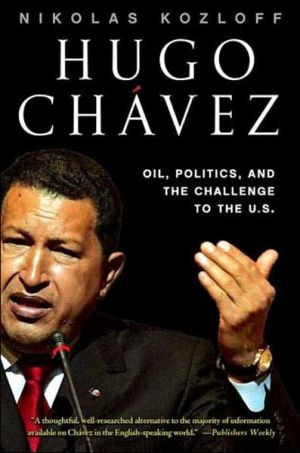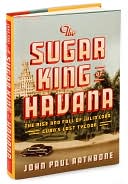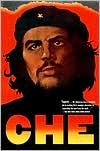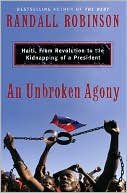Hugo Chavez: Oil, Politics, and the Challenge to the U.S.
Audacious, provocative, and bombastic, few world politicians are as colorful as Hugo Chávez, now making international news for his plans to nationalize U.S. owned businesses and his bold opposition to Washington's economic and trade policies. As Venezuela gains importance as the fifth largest oil exporter in the world, this firebrand leader is quickly moving to the public spotlight by uniting much of South America against the Bush administration and wielding oil as a "geopolitical weapon." To...
Search in google:
A timely look at Venezuela's controversial president Hugo Chávez Publishers Weekly Hugo Chavez has put Latin America back on the U.S. radar with his outspoken attacks on American imperialism and his leadership in forming economic ties among Latin American nations outside U.S. influence. To many in the southern hemisphere, he represents a welcome alternative to the U.S., whose efforts to heal the region's economic woes through the World Bank and the IMF have largely failed. In the northern hemisphere, he is often seen as a threat to free-trade agreements and democracy in the Americas. Kozloff, a senior research fellow for the Council on Hemispheric Affairs, tries to neutralize the latter image as he recounts recent Venezuelan history and analyzes Chavez's rise to power. Paying equal attention to Chavez as a man and as a political phenomenon, he inserts slow-moving anecdotes among dense historical details, making for an uneven read. Kozloff's use of sources like the Nation, the New Left Review and the International Socialist Review, as well as his participation in the antiglobalization movement, also reveal a leftist bias toward Chavez. He offers little criticism of Chavez's policies or the nondemocratic means a 1992 failed coup through which he first garnered public favor, before winning office in a 1999 election and 2002 reelection. But while this bias might make for some one-sided storytelling at times, it also makes for a thoughtful, well-researched alternative to the majority of information available on Chavez in the English-speaking world. (Sept. 19) Copyright 2006 Reed Business Information.
1"Oil is a geopolitical weapon"72The battle for control over oil233TINA - "there is no alternative"374Chavez and his fight against neoliberalism535Chavez's civil-military alliance776The test of Chavez's civil-military alliance917Chavez's South American oil diplomacy1058Chavez and the information war against the Bush administration1199In the Andes, turning the tide against the United States13310The Chavez-Morales axis153
\ From the Publisher"A thoughtful, well-researched alternative to the majority of information available on Chávez in the English-speaking world."—Publishers Weekly"A reasoned, historical presentation of Chávez's rise to power and the social context which produced him."—Political Affairs\ “This book is highly recommended reading for those who want to understand Chavez beyond his rhetoric – the real basis of his support and his actual policies.”—Journal of Peace Research\ \ \ \ \ \ Publishers WeeklyHugo Chavez has put Latin America back on the U.S. radar with his outspoken attacks on American imperialism and his leadership in forming economic ties among Latin American nations outside U.S. influence. To many in the southern hemisphere, he represents a welcome alternative to the U.S., whose efforts to heal the region's economic woes through the World Bank and the IMF have largely failed. In the northern hemisphere, he is often seen as a threat to free-trade agreements and democracy in the Americas. Kozloff, a senior research fellow for the Council on Hemispheric Affairs, tries to neutralize the latter image as he recounts recent Venezuelan history and analyzes Chavez's rise to power. Paying equal attention to Chavez as a man and as a political phenomenon, he inserts slow-moving anecdotes among dense historical details, making for an uneven read. Kozloff's use of sources like the Nation, the New Left Review and the International Socialist Review, as well as his participation in the antiglobalization movement, also reveal a leftist bias toward Chavez. He offers little criticism of Chavez's policies or the nondemocratic means a 1992 failed coup through which he first garnered public favor, before winning office in a 1999 election and 2002 reelection. But while this bias might make for some one-sided storytelling at times, it also makes for a thoughtful, well-researched alternative to the majority of information available on Chavez in the English-speaking world. (Sept. 19) Copyright 2006 Reed Business Information.\ \ \ Library JournalKozloff (senior research fellow, Council on Hemispheric Affairs, Washington) takes on one of the more controversial figures of the early 21st century in examining Chavez, the president of Venezuela. Venezuela's role as the fifth-largest oil exporter provides a unique dynamic to both its internal and its external political relations. Kozloff draws on years of experience in Venezuela and on numerous interviews both with top Chavez advisors and with political opponents. What emerges is a complex picture of Chavez part populist, part Socialist revolutionary. The focus of the work is on the use of oil to solidify Chavez's internal political party and his ability to use oil also to build an international agenda and an international following. For example, Chavez has actively sought to build an alliance with Luiz Inacio Lula de Silva of Brazil, with the goal of creating a South American energy alliance. Kozloff's book is useful both for its biographical background material on Chavez and fot its pertinent insights into his ways. Recommended for all libraries. Deborah Lee, Mississippi State Univ. Libs., Starkville Copyright 2006 Reed Business Information.\ \








